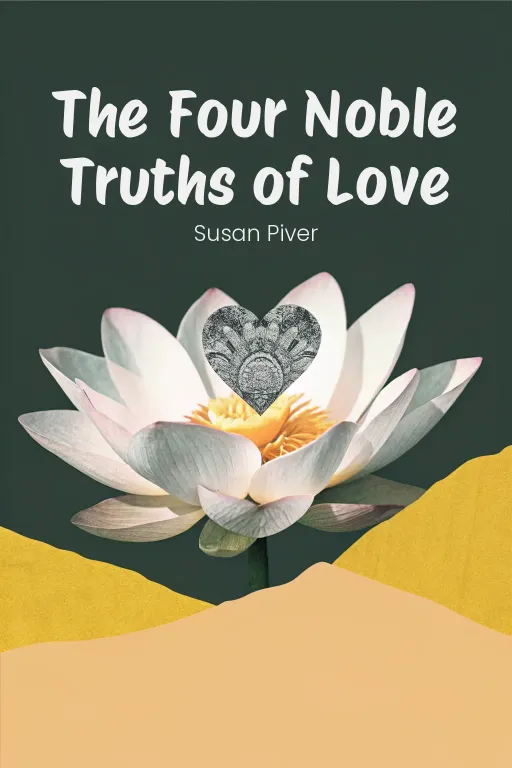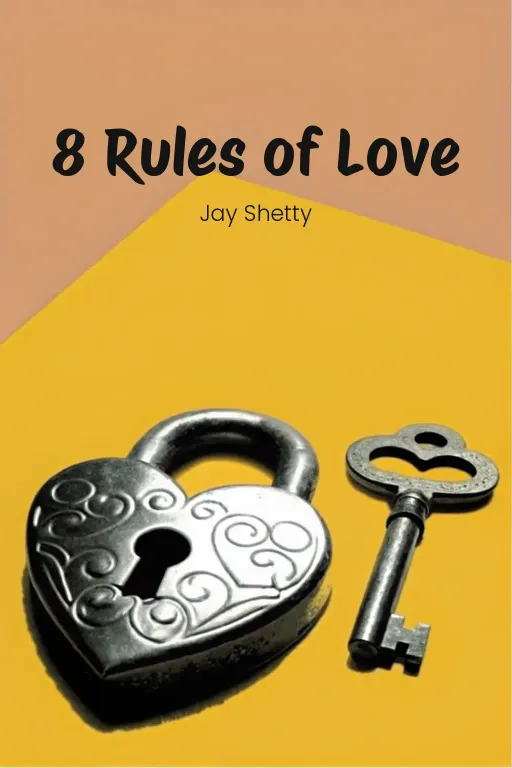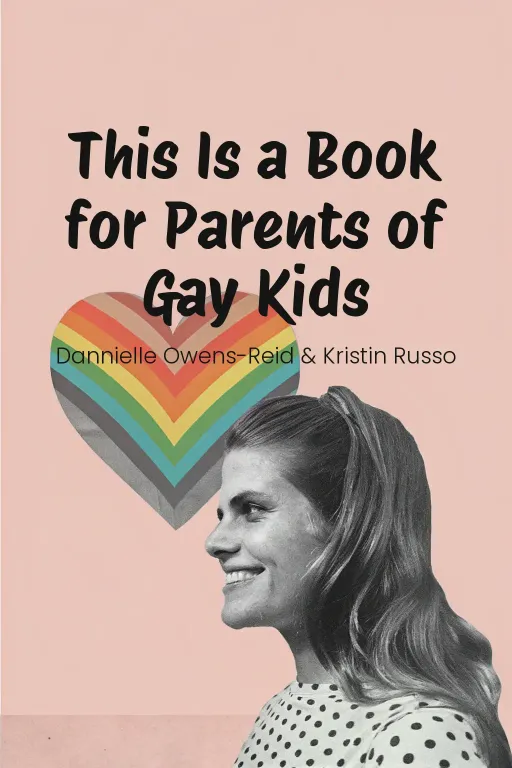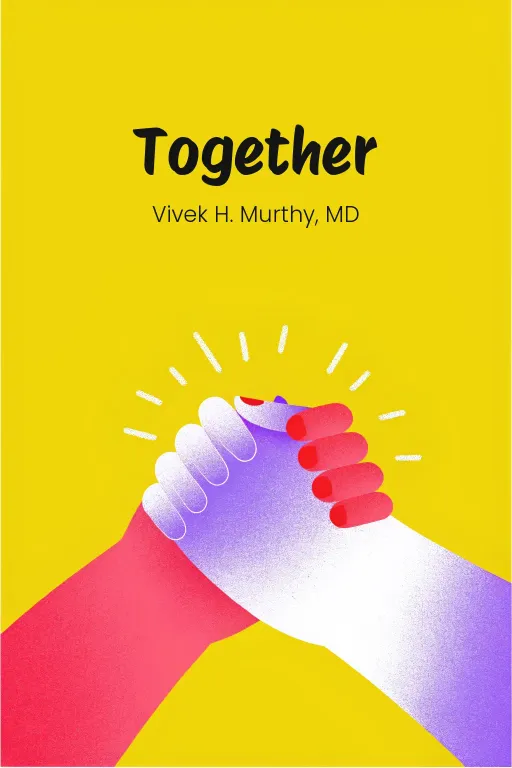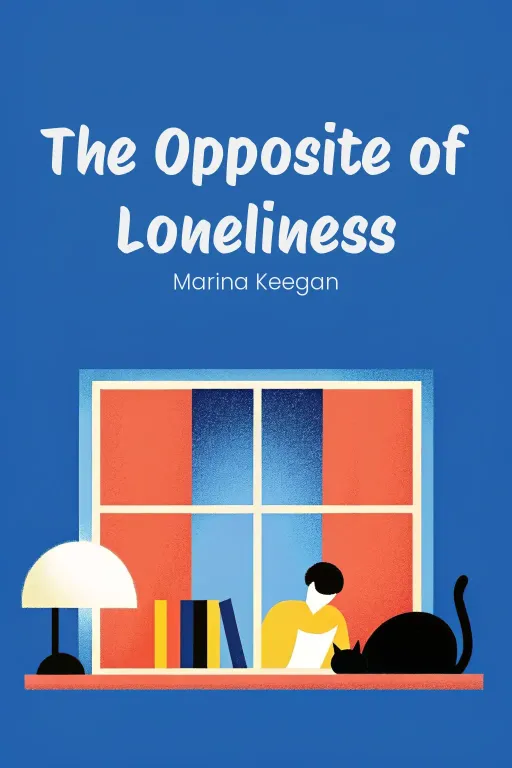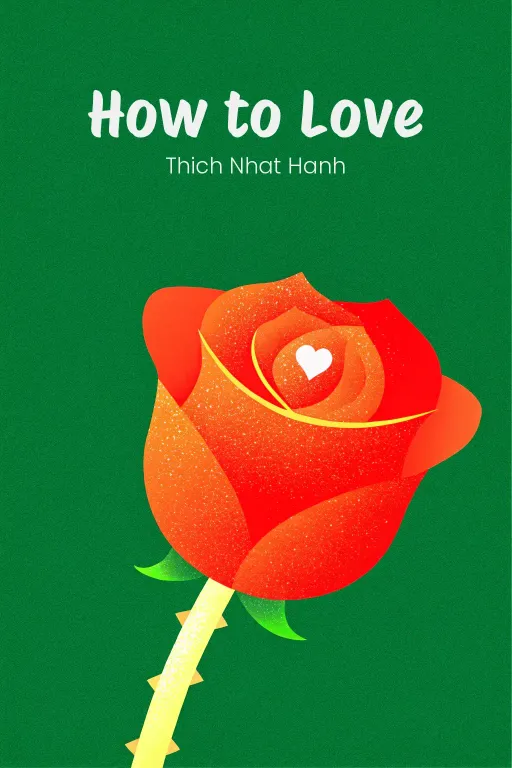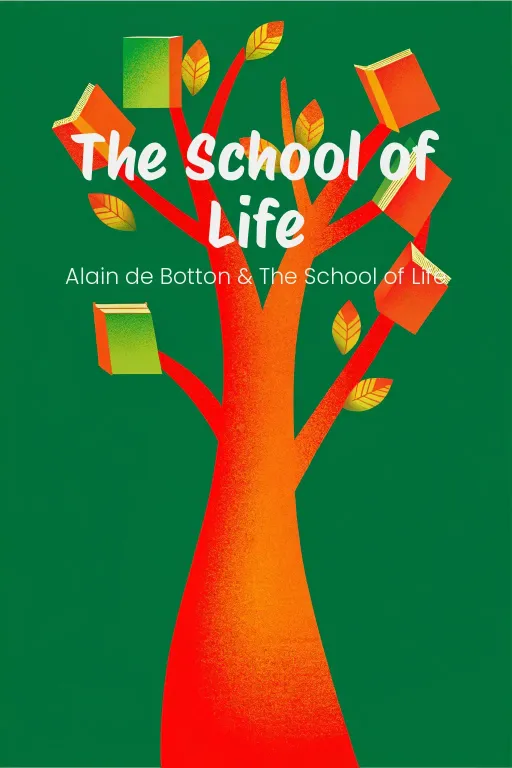
Love's Messy Truth: Find Your Calm Now!
Podcast by The Mindful Minute with Autumn and Rachel
Buddhist Wisdom for Modern Relationships
Introduction
Part 1
Autumn: Hey everyone, welcome back to the podcast! Let’s kick things off with a question: How often does it feel like your relationships are this tangled mix of love, chaos, and just plain head-scratching confusion? Sound familiar? You’re definitely not alone. Rachel: Right? I mean, Autumn, if love were all sunshine and rainbows, why do so many date nights end with some kind of disagreement? Autumn: Exactly! And that's why The Four Noble Truths of Love by Susan Piver is such a game-changer. Instead of portraying love as this perfect, unchanging ideal, she looks at it as this messy, evolving, and ultimately beautiful “process”. Drawing from Buddhist philosophy, Piver uses the Four Noble Truths to show us that relationships are inherently unstable... and you know what? That's okay. Rachel: So, basically, the book's like, "Look, your love life might be a complete disaster sometimes—and that's perfectly normal." Autumn: Precisely! But she also provides us with tools to navigate that mess with both compassion and mindfulness. Through personal anecdotes and meditative practices, Piver teaches us how to embrace vulnerability and transform challenges into opportunities for deeper connection. Rachel: Which brings us to what we're talking about today. We've picked out five key ideas that should take us from, you know, poetic philosophy to some actual practical advice for relationship survival. Autumn: First off, we’re going to unpack the Four Noble Truths of Love and explore why instability isn't just something that happens—it's actually totally natural. Rachel: Then, we’ll get into this emotional balancing act between attachment and non-attachment. Because apparently, loving someone doesn’t mean you have to cling to them for dear life. Autumn: We'll also explore the three poisons: aggression, ignorance, and fear. These are the emotional culprits that can “really” sabotage connections, you know? Rachel: And don't worry, we're not just going to point out the problems. We've got some actual mindfulness practices that will help you cultivate love on a daily basis. Autumn: Finally, we’ll share some practical strategies for gracefully navigating those inevitable relationship storms. Because let’s be honest, sometimes love feels less like a calm lake and more like living through a hurricane. Rachel: So, whether you're in a relationship, out of one, or somewhere floating in between, stay... no, just keep listening as we dive into today's insights!
The Four Noble Truths of Love
Part 2
Autumn: Okay, let's dive in, starting with the foundation – the Four Noble Truths of Love. Susan Piver, in her book, adapts this core Buddhist concept to relationships. And the first truth? Well, it's a bit of a shock to the system: relationships never stabilize. Rachel: Never? Seriously? Not even after, say, thirty years together, and you get that whole Ikea furniture assembly thing down to a science? Autumn: Nope, not even then! Piver argues that believing in some final, stable endpoint is one of the biggest misconceptions about love. It's like trying to stop a river from flowing. It just goes against the fundamental nature of relationships, which are dynamic, always changing, just like life. Rachel: So, here I was thinking the ideal couple could just wake up one day and go, "Okay, we've achieved perfect harmony, now we can chill forever." But instead, you're telling me it's a never-ending emotional construction project? Autumn: Exactly! Take something super common, like arguments. Piver talks about how even the smallest disagreements – what to have for dinner, say – can turn into a whole thing. It's not that those moments are catastrophes, but they show how relationships constantly shift, and need attention. Rachel: Wait a minute. So you're saying that beneath the surface, the Great Sushi Versus Pizza Debate is about more than just simple hunger-induced decision-making? Autumn: It absolutely can be! She describes how, early on in her relationship with her husband, Duncan, even little conflicts carried a lot of emotional weight. A simple yes or no could lead to overthinking–"What does this mean for us?" It’s that restlessness, that uncertainty, that reminds us relationships are alive. They flow, you know, between connection and disconnect. Rachel: Which, frankly, sounds exhausting. If things never stabilize, what's stopping people from just binge-watching Netflix and calling it a day? Autumn: Well, that's a fantastic question. Buddhist philosophy teaches us to embrace impermanence without resistance. The instability isn't the problem, it's just reality. The suffering comes when we expect relationships to be static. And that’s where the second truth comes into play. Rachel: Ah, here we go. Let me guess. Expecting stability is kind of like trying to bring back old TikTok trends. Desperate, kind of doomed, and just generally... cringy. Autumn: Pretty close! The second noble truth of love is this: It's not the instability itself that causes suffering, but the expectation that relationships should provide ultimate comfort and security. Rachel: Oh, the classic "Why isn't my partner also my therapist, life coach, and emotional sponge?" dilemma. Autumn: Exactly! Piver shares a key insight from a marriage counselor she and Duncan once saw. They said, "Expecting relationships to be stable is what makes them unstable." It totally changed her perspective. Instead of seeing arguments or differences as signs of failure, she started seeing them as a natural part of growing together. Rachel: So, you're saying the issue isn’t arguing over who does the dishes. The issue is expecting there won't be arguments? Autumn: Precisely! Piver reframed conflict as an opportunity. Like, instead of getting stuck in the "who's right" loop during counseling, she and Duncan started seeing disagreements as a chance to understand each other’s emotions, triggers, unmet needs—it’s like zooming out to see the bigger picture, rather than getting caught up in the immediate problem. Rachel: Okay, but here comes my inner skeptic. How do you avoid the trap of thinking, “Oh, we're fighting, but it’s just for the sake of personal growth"? That feels a little... performative. Autumn: Right, that’s where the intentional practice comes in, which she goes into more in the other truths. Essentially, it's not about pretending conflict is fun or desirable. It's about pausing to recognize the underlying dynamics. Like, when you're fighting, is it about the actual dinner menu, or is it really about feeling unheard or unappreciated? Naming those deeper dynamics kind of takes the sting out of it, and opens up communication. Rachel: So, it's like treating relationships as this improv class? You never really know what's coming next. But instead of freezing up or trying to force a specific line of dialogue, you just roll with it, respond authentically, and hope neither you nor your partner ends up playing the straight man. Autumn: That’s a great analogy! Actually, it really leads into the third truth, which is all about what to do with that instability. Piver basically says the essence of love is meeting instability together. Rachel: Oof, okay, now we're getting a bit... metaphysical. So translating "meeting instability together" into the real world... what does that actually look like? Autumn: It's about intention and presence, even during the messy bits. She shares a story where she and Duncan had another argument–about takeout, of all things. But instead of letting it explode, they paused. They shared how tired and disconnected they both felt, and kind of removed the surface-level blame. That moment of mindfulness turned a potential blowup into a shared moment of empathy. Rachel: You mean, rather than turning that tiny spark of tension into a total wildfire, they fanned it into... a cozy campfire for two? Autumn: Perfect metaphor. Love, in this framework, isn't about never having sparks. It's about learning to sit by the fire together, even when the heat gets uncomfortable. Rachel: I get that. But let's be real, Autumn–if I tried to pull this off in the middle of some dinner argument, my partner might think I'd been possessed by some wellness influencer. It’s not instinctive for everyone to just pause and go, "Let's talk about our feelings right now." Autumn: True—which is why Piver pairs this whole philosophy with mindfulness practices that help you cultivate those habits over time. It takes emotional vulnerability and curiosity, which, to be honest, can feel really raw and awkward at first. Rachel: Vulnerability—everyone's favorite word that they're secretly terrified of. Autumn: It is terrifying! But it's also what strengthens connections. Like, during an argument, instead of assuming your partner is being difficult, you might wonder, "What's really going on for them? What are they feeling underneath all of this?" It kind of shifts the conversation from some head-to-head confrontation, to heart-to-heart curiosity. Rachel: And, as much as it pains me to admit, there’s something pretty powerful about reframing the argument not as some battlefield, but as, I guess, this bridge-building session. Or, at least, a rickety ladder across a chasm. Autumn: Oh, I love that image—a relationship as a shared project, rather than just this place where we offload all of our unmet desires. That's truly the heart of Piver's approach: embracing the mess and meeting it with more courage, not more control.
Emotional Waves and Attachment
Part 3
Autumn: So, after grasping those core truths about love, we can delve into how emotional dynamics actually play out in relationships. Susan Piver's insights on emotional waves and attachment really resonate here. She builds on the Four Noble Truths by exploring the emotional consequences of instability and, well, attachment. Rachel: Emotional waves, huh? So, are you saying relationships are basically like surfing? You catch a wave and just hope you don't wipe out and face-plant? Autumn: You know, that's a surprisingly apt metaphor. Piver talks about how relationships are inherently dynamic. Full of highs and lows, crests and crashes... like emotional waves. She connects this to nonattachment – a core Buddhist principle. It’s about balancing our emotions without clinging to joy or despair. Rachel: Okay, hold on. Nonattachment sounds suspiciously like "Hey, don't care too much." How does that even work in a relationship? Isn’t attachment kind of the whole point of love? Autumn: That's a common misconception. Nonattachment isn’t indifference. It’s learning to love fully, but without holding on so tight that you suffer when things inevitably change. Rachel: Alright, break it down. How does nonattachment play out in the real world? You know, a not-so-Zen, everyday scenario? Autumn: Piver shares an example from her early relationship with her husband, Duncan. At first, their interactions were filled with excitement, but also anxiety. They had moments of deep connection, but then... also miscommunication or silence. She describes clinging to the idea of how their love should be. That just intensified her fear of losing it. Rachel: So, let me guess: Idealizing the relationship led to unnecessary stress? Autumn: Exactly! Her emotional highs depended on things going smoothly. And when they didn’t, the lows hit even harder. Over time, Piver learned to let go. To let go of constantly trying to control or define the relationship’s future. Instead, she embraced the relationship as it was in each moment, whether that moment was full of laughter or awkward tension. Rachel: Wait a second. Are you saying she had to love Duncan while being ready to let him go at any moment? How is that not the romantic version of walking a tightrope without a safety net? Autumn: It can feel that way! But it’s fundamentally about trust. Trusting yourself to weather emotional storms. And trusting that love can thrive, even without guarantees. Think of it this way: Clinging to the idea of permanence in love is like trying to freeze the ocean. Love is fluid, not static. Rachel: Right, so instead of fighting the waves, you grab a surfboard and hope you have decent balance? Autumn: Absolutely. This shift lets us appreciate the highs, without fearing their end, or the lows that might come next. But it’s not just about dealing with emotional waves alone. It's also about telling the difference between the healthy and unhealthy ones. Rachel: Ooh, are we venturing into sadness territory here? Because I have some follow-up questions about that whole "good sadness" thing. It feels kind of counterintuitive. Autumn: That’s exactly where we’re going. Piver says that sadness, engaged with mindfully, can deepen connection, not isolate. She references Gloria Steinem’s insight that sadness shows you care deeply, while depression isolates you from meaning. Rachel: So, sadness isn't always bad? It's like a poignant rom-com – painful, but still meaningful? Autumn: Exactly. For Piver, sadness can be transformative if we sit with it and see it for what it is... a wave that eventually passes. She describes a moment in her marriage with Duncan, during a tough time. They could’ve avoided the sadness, or let it build into resentment. Instead, they sat with it together. They openly acknowledged their vulnerabilities, without shame. Rachel: You know, cynical as I am, I get the power in that. It’s saying to your partner, “Hey, sadness is here. Let’s invite it in, instead of locking the door.” It’s harder to feel disconnected when you're both acknowledging the elephant in the room. Autumn: Exactly! By treating sadness as a shared experience, not a personal failure, they found a deeper connection. It became bittersweet, but bonding. And it reinforced that relationships thrive when we lean into, rather than resist, difficult emotions. Rachel: Still, let’s not pretend this is easy. Most couples in the middle of a fight aren’t thinking, "Wow, what a great opportunity to deepen our love." Autumn: Fair. And that’s why tools are essential. Piver offers a few. One is mindfulness. Just taking a moment during emotional waves. Pause, breathe, and notice what’s happening, without escalating. Rachel: So, instead of spiraling into “We’re doomed, because we argued about whose family to visit for the holidays,” you just say, "Hey, maybe we’re both tired and stressed?" Autumn: Exactly. Another tool she recommends is loving-kindness meditation. It’s about extending goodwill to yourself and your partner. Repeating phrases like "May we find peace," or "May I have patience," can soften attachment. It can also shift focus away from blame, towards compassion. Rachel: I can see how that would work. Though, I might need a few practice rounds to avoid snarky thoughts, like, "May you stop leaving your shoes in the hallway." Autumn: That’s honest, and it’s a start! Practicing these habits regularly, not just during crises, builds the emotional capacity to handle conflicts with more presence and less reactivity. Rachel: Okay, I'll hand it to her. Addressing emotional waves with mindfulness and vulnerability does feel... oddly empowering. Instead of controlling the tides, you just build a better boat, together. Autumn: Well said, Rachel. That’s the heart of Piver’s approach. Inviting us to let go of control and embrace the waves. Not for perfection, but for deeper connection.
The Three Poisons of the Mind
Part 4
Autumn: Okay, so, keeping these emotional dynamics in mind, we're going to examine the mental habits that can either disrupt or nurture love. Susan Piver introduces us to what she calls the "Three Poisons of the Mind,"—aggression, ignorance, and fear. And these are basically emotional and psychological habits that can “really” wreak havoc on our relationships if they're left unchecked. Rachel: Let me guess, Autumn—are these like the Big Three villains in every love story? Aggression, the fiery bad guy, right? Ignorance is the clueless one, and fear... the quiet puppet master pulling all the strings from behind the curtain? Autumn: <Laughs> Wow, Rachel, that's surprisingly accurate! In Buddhist philosophy, these poisons are seen as, like, the root causes of suffering, especially in relationships. They can show up as conflict, avoidance, or defensiveness, and ultimately, they keep us locked in cycles of disconnection. Piver’s approach is all about recognizing when these poisons show up and then working to transform them with awareness and, you know, compassion. Rachel: Alright then, let's start with the one that sounds like it gets loud real quick—aggression. What exactly does Piver mean by “that” in the context of relationships? Autumn: Aggression in relationships often comes from feeling misunderstood, threatened, or just emotionally overwhelmed. And I think the classic image is yelling or slamming doors, but aggression isn't just about, you know, big blowups. It can also take more subtle forms, like sarcasm or even withdrawing into silence as a way to punish the other person. Actually, Piver shares a pretty specific example from her own marriage with Duncan—a story about their very different conflict styles. Rachel: Ah, it’s always fun when one person's got a fiery temper and the other's carefully building a battle plan. So, what happened? Autumn: Exactly. Duncan's style was what she described as a "street fighter" – he brought raw, unfiltered emotion into arguments. Like a storm. And Susan? Well, she wanted structure and rules for engagement; almost like forming a debate club mid-conflict. One incident actually started with something pretty minor – dinner plans – but it quickly escalated 'cause their responses totally clashed. Duncan's explosive approach just overwhelmed her, while her attempts to "contain" the situation felt dismissive to him. Rachel: So, basically, he came in with a flamethrower, and she tried to build a fortress. But instead of peace, it just turned into a siege. Autumn: Exactly. And, you know, that's a perfect metaphor for how aggression can amplify division. It's not even about who's "right”. The real danger is that aggression causes both partners to, like, double down on their positions, which just magnifies the disconnect. But what Piver teaches is that aggression, at its core, often stems from unacknowledged fear or vulnerability. Rachel: Hmm. So, maybe Duncan wasn't just being angry for anger's sake. He was probably feeling something deeper – like frustration at not being heard or, you know, fear of disconnection? Autumn: Precisely. And Susan's own reaction – trying to control the argument with rules – came from her fear of emotional chaos and losing stability. When they realized this, it didn't like, "solve" their arguments instantly, but it gave them a different lens to approach fights with, you know, more curiosity and less defensiveness. Rachel: Okay, but help me out here. Let's say I find myself in a heated argument. How do you, like, hit the brakes before the aggression drives off a cliff? Autumn: Piver recommends a "Pause and Reflect" strategy. So, couples can create a mutually agreed signal – like raising a hand or saying, "Pause" – to momentarily stop the conflict when it starts escalating. The goal isn’t to avoid the conversation, you know, just taking a breather to regroup emotionally and to create space between your reaction and your response. Rachel: Sounds like a relationship version of a yellow card in soccer. Step back and think before you get ejected from the game. But, let's be real – what if you've already hit the shouting stage? Does this still work when tensions are high? Autumn: It can, but it takes practice! If a full pause feels impossible, even just focusing on a few deep breaths can help cool down your nervous system. Breathwork is a simple but, like, “really” powerful way to shift from fight-or-flight mode into a place where you can actually listen to each other again. Rachel: Alright, you're selling me on the pause idea—maybe I’ll add that to my imaginary toolkit for future arguments. So, what’s next? Ignorance, right? Autumn: Yes, and in this context, ignorance, well, it isn't about a lack of intelligence. It's more about dodging truths we don't want to deal with in our relationships. This could be like deflecting, distracting yourself with work or social media, or just flat-out refusing to engage when tough emotions pop up. Over time, ignorance builds emotional distance and that leads to stagnation. Rachel: Wait a second. So, ignorance is like the emotional version of putting on noise-canceling headphones when the fire alarm's blaring, right? Autumn: Exactly. Piver talks about how this avoidance can show up when one partner keeps trying to connect while the other retreats into distractions, like scrolling Instagram or burying themselves in work. It's a dynamic that can leave both partners feeling isolated – the one reaching out feels rejected, and the one avoiding feels, you know, overwhelmed. Rachel: But that retreat often feels safer, doesn't it? I mean, if talking leads to conflict, distractions like TikTok or work seem like pretty appealing escapes. Autumn: They do, but those escapes come at a cost. When we avoid discomfort, we miss chances to connect or resolve those underlying issues, you know? Piver shares how ignoring vulnerability just slowly erodes trust. It's like watching a tiny crack in a dam grow larger because no one wants to fix it – it's going to break eventually. Rachel: So, how do you combat this? Besides chucking your phone out the window, obviously. Autumn: For starters, mindfulness practices, like breath-awareness meditation, can help individuals face discomfort without shutting down. The idea is to stay present with your emotions instead of running from them. Ah, and she suggests setting aside intentional “listening spaces,” where couples agree to sit down regularly and share their thoughts and feelings without interruption or solutions. It’s fostering curiosity rather than avoidance. Rachel: Okay, I like that. Instead of running from the metaphorical crack in the dam, you schedule a little inspection time—fix the leaks before the situation floods. Autumn: Exactly. With regular engagement, even small shifts can break the cycle of avoidance and create a more open, trusting connection. Rachel: Alright, two poisons down, one to go. Fear—always lurking in the shadows, huh? Let’s hear it.
Practices for Connection and Mindfulness
Part 5
Autumn: Okay, so now that we've identified the poisons, let's talk about some practical tools for cultivating healthier relational habits. This is where Susan Piver’s work really shines. She doesn’t just point out the problems, she gives us actionable practices for bridging those connection gaps and fostering mindfulness. It’s all about solutions. Rachel: Right, so we're shifting from "crisis mode" to "here's a toolkit" mode. Let's dig in. Autumn: Exactly. Piver introduces three cornerstones: breath-awareness meditation, lovingkindness meditation, and mindful conversation. Each tool offers a pathway back to connection, emotional resilience, and presence. Let's start with breath-awareness meditation, which really is about cultivating presence. Rachel: Breath-awareness – isn't that like, the ultimate mindfulness cliché? "Just breathe, and all your problems disappear!" How does that actually help a relationship? Autumn: Well, it's more deliberate than that. Think of it as creating a pause button. When emotions are running high or conversations get tense, having a focal point, like your breath, gives you a way to step out of reactivity. You're not just drowning in frustration; you're observing it. It helps create some emotional space. Rachel: Okay, I'm tracking. So, in the real world, how do you go from "snapping in the middle of a fight" to "pausing to breathe"? Autumn: Susan shares a story about a disagreement with her husband, Duncan, over their living situation. They were both overwhelmed. She was dealing with migraines and not liking their home, and he was under a ton of work stress. Instead of letting it escalate, she used breath-awareness to pause, focus inward, and regulate her emotions. Rachel: So, instead of jumping down the "who's right" rabbit hole, she literally hit pause with her breath? That’s... surprisingly practical. Autumn: Right? It wasn't about avoiding the problem, but about calming her mind down enough to address it with some clarity. Kind of like cooling down an engine before trying to drive up a steep hill. Rachel: Okay, let’s say someone's listening and wants to try this. What's the actual process? Autumn: Simple. Find a quiet place, sit comfortably, and bring your attention to your breath. Feel the air entering your nostrils, or notice your chest rising and falling. When your mind wanders, and it will, gently bring your focus back to your breath. Over time, this practice strengthens your ability to stay grounded in tense moments. Rachel: Alright, sounds doable. But what about when "taking a breath" feels impossible, like, smack-dab in the middle of a screaming match? Autumn: It’s about consistency. Regular practice makes it second nature. Even just taking a single intentional breath amid the chaos can shift the tone of the fight. It interrupts the cycle of reactivity, and then it creates room for a different kind of response. Rachel: Alright, breath-awareness – solid. What’s the next tool? Autumn: Lovingkindness meditation, or metta. It’s a practice of extending compassion, starting with yourself, and then rippling outward to your partner, even when you're in conflict. Rachel: This sounds like a challenge! Let me guess -- my initial thoughts will probably be like, "May you finally stop leaving your socks on the floor?" Autumn: <Laughs> Actually, yes! The beauty of lovingkindness is that even a sarcastic first attempt can, with practice, open the door to genuine compassion. Susan talks about how it helped her rekindle warmth during a difficult time with Duncan. She started with simple phrases for herself: "May I be happy, may I be peaceful." Then she extended them to Duncan: "May you be happy, may you be free from suffering." Rachel: And repeating those phrases was enough to shift her mindset? Autumn: Over time, absolutely. It softens defensiveness and replaces blame with curiosity. Focusing on well-wishing, even when you’re frustrated, helps you reconnect with the person underneath the argument. Rachel: Okay, walk me through the how-to. Autumn: Find a quiet space, sit comfortably, and start with yourself. Silently repeat phrases like, “May I be safe, may I be happy, may I live with ease.” Once those intentions feel solid, shift to someone you love, like your partner, and repeat the same phrases. From there, you can branch out to other people. Rachel: Alright, I’m picturing this. Me, sitting on the couch, wishing my loved ones peace. But if I’m in the middle of a fight, aren’t they just going to think I've completely checked out? Autumn: That’s fair. The practice is about building an internal habit, like a mental gym for your compassion. You’re not performing it for them; you’re cultivating kindness within yourself, which naturally influences how you show up during conflicts. Rachel: Hmm, alright. I can see how this could take the edge off, even if it takes time to feel natural. What’s the final practice? Autumn: It's mindful conversation. It’s about engaging with deliberate focus, active listening, and intentional speech. In relationships, our daily interactions – about chores, scheduling, our feelings – can become so transactional that we lose the deeper connection. Rachel: Right, like when "How was your day?" really means "Let's do our obligation summary before I start doing something else." Autumn: Exactly. Susan and Duncan worked through periods of disconnection by introducing structured dialogue. One person would share, without interruption, while the other person truly listened, responding only with things like, “Thank you for sharing.” Rachel: No rebuttals? No “Well, actually, you’re wrong?" That could be revolutionary. Autumn: It was. Removing interruptions created a safe space for both of them to fully express themselves, without fear of judgment. It emphasized presence over problem-solving, which can often turn conversations into debates, rather than opportunities for connection. Rachel: How do couples implement this without feeling super awkward? Like, "Hey, honey, it's Mindful Conversation Time! Let's get deep!" Autumn: Start small. Dedicate five or ten minutes a week to uninterrupted sharing. No phones, no agenda. Each partner gets a turn to speak while the other listens without interjecting. The goal is to listen without getting defensive, or feeling the need to fix anything. Rachel: Let me guess, you've got to resist the urge to say, "Well, actually…" during that time? Autumn: Yes, Rachel! It’s not about scoring points; it’s about creating emotional space where your partner feels heard and validated. Even if you disagree, acknowledgement alone can diffuse tension and build trust. Rachel: Alright, structured conversation feels… a little forced. But, hey, maybe some couples need training wheels for communication. Autumn: Think of it as an investment. Like we’ve been saying, relationships thrive when we meet instability together. These practices – breath-awareness, lovingkindness, mindful conversation – they’re not quick fixes. They’re tools for cultivating emotional resilience and depth, one moment at a time. Rachel: So, essentially, love is less "happily ever after" and more "work in progress… but with awesome tools." Autumn: Absolutely. And with mindfulness, that progress becomes an opportunity, not just a challenge.
Navigating Crises and Change
Part 6
Autumn: So, with these practices in mind, we can really start thinking about how to apply them when relationships get tough. And that naturally leads us to one of the biggest tests of love: dealing with crises and change. Ultimately, it's about resilience and being able to adapt, which brings us back to the idea that love is a journey that's always evolving. Rachel: Crises and change, huh? Sounds intense, and pretty much unavoidable, right? No relationship sails along smoothly forever, does it? Autumn: Exactly. That's really what Piver's getting at. Instead of seeing crises – whether they're caused by things like addiction, different values, or unexpected life changes – as disasters waiting to happen, she sees them as opportunities to actually make your connection stronger and learn to adapt. It's like, love isn't about avoiding storms; it's about learning how to weather them, together. Rachel: Okay, so we're talking about reframing crises as some kind of relationship boot camp? Tough, but potentially good for growth? Autumn: Precisely! Take addiction, for example. Piver describes it as a crisis that brings a really complex duality into love. It's like one partner's light exists alongside moments of darkness. Navigating that requires a really delicate balance of compassion and taking care of yourself. Rachel: Addiction – that's a tough one. Honestly, it must be so hard to love someone who's, say, kind and caring most of the time, but then creates chaos the rest of the time when the addiction takes over. How does she even suggest dealing with that? Autumn: She talks about the emotional conflict it stirs up. You really care about someone's good qualities, but you're constantly dealing with the fallout from their addictive behavior. It's like trying to dance with someone who keeps missing a step, and the question is, how do you find stability in that situation? Rachel: Does she offer a real-world example to kind of illustrate this? Because, conceptually, it sounds pretty difficult. Autumn: She talks about couples counseling as a potential lifeline. Instead of trying to fix the addict or just ignoring the pain, therapy creates a safe space where both partners can express their anger, their pain, and their hopes, and feel supported. It helps break the cycle of enabling destructive behaviors. This counseling process acts like a mirror, helping each person see patterns they might have missed before. Rachel: But where do you draw the line, right? I mean, there has to be a point where love and loyalty start to become self-sacrifice, maybe even harmful, doesn’t it? Autumn: Exactly, and that's one of the trickiest parts. She stresses that self-care is absolutely essential in these situations. Loving someone doesn’t mean you have to put up with destructive behavior forever. For some couples, the whole crisis becomes a really transformative chapter. For others, it highlights that they need to separate for their own well-being. Either way, moving forward requires being emotionally strong and getting professional guidance. Rachel: So, she's saying that love in these situations isn't just about sticking it out. It's about asking tough questions: can the relationship actually adapt, or has it just reached its breaking point? Autumn: Exactly. And speaking of tough adaptations, that leads us to another common, but challenging theme: differing values. Rachel: Oh boy. As if dealing with everyday habits wasn't hard enough, now we're talking about fundamental differences in how you see the world. Autumn: Exactly. Piver talks about how certain differences in values – things like religious beliefs, cultural traditions, or what you want in life long-term – can create real cracks in a relationship. These aren't things you can just ignore, because they're closely tied to who you are as a person. Rachel: Give me an example here, Autumn. Like, what if one person wants to go to church every Sunday, while the other prefers brunch and watching Netflix? How does that play out? Autumn: That's a perfect example. At first, those differences might not seem like a big deal – one person goes to church, the other stays home. But over time, those differences can “really” start to add up. What about raising kids? Or how their faith, or lack of it, affects family traditions? Piver suggests that if you don't have open conversations about your boundaries and what you absolutely won't compromise on, these little conflicts can turn into major problems. Rachel: But isn't compromise what everyone always suggests when it comes to values? Like, "Can't we just agree to disagree?" Autumn: Compromise is important, but only to a certain point – when it doesn't start to make you feel like you're losing yourself. Piver says it's important to know what your non-negotiables are, those core values you're not willing to budge on. Without that clarity, what seems like compromise can become a source of resentment, when one person feels like they've given up too much of who they are. Rachel: So, the key is to figure out which values you can be flexible with and which ones are set in stone. Is that the idea? Autumn: Exactly. And having those honest conversations as early as possible helps you either find a resolution or realize that the differences might be too big to overcome. It's about being clear upfront so things don't build up into unresolved resentment. Rachel: Alright. But let's move on from the ripples of differing values to full-blown tidal waves: those crises you just don't see coming. What about those? Autumn: Piver shares an example from her own marriage during a really difficult time. She was struggling with severe migraines and feeling frustrated about their living situation, while her husband, Duncan, was dealing with a lot of stress at work. One evening, all of those tensions blew up, creating a real divide between them. Rachel: Classic domino effect – one external stressor throws the whole relationship off balance. What happened? Autumn: At first, they both fell into their usual patterns: she expressed how unhappy she was, and he got defensive. But then came the turning point: Instead of blaming him, Piver allowed herself to show vulnerability. She openly shared her fears and pain, but without accusing him, just as a raw expression of how she felt. Duncan, in turn, didn't try to fix her problems or dismiss her feelings. He offered his presence – a hug, actually – that reconnected them emotionally, even though the situation itself hadn't changed. Rachel: Wow. So, it wasn't about fixing the problems. It was about changing how they reacted to each other in that moment. Autumn: Exactly. Piver calls it “choosing connection over control.” They couldn't control the migraine or the work deadlines, but they could face the emotional storm together, with understanding and care. Rachel: I'll admit, that's pretty powerful. It's like, even in a storm, they found a way to share the same umbrella instead of fighting over it. Autumn: Beautifully put. And that leads into her strategies for building resilience during tough times. These include taking care of yourself, being willing to be vulnerable, seeking support from others, and accepting that things change. Together, they help couples learn to face challenges head-on instead of being afraid of them. Rachel: Alright, Autumn. It sounds like this whole idea of embracing crises and change is a masterclass in being both vulnerable and adaptable. Not easy, but definitely something that can change you for the better.
Conclusion
Part 7
Autumn: So, to bring our conversation to a close, Susan Piver “really” drives home that love isn't about this rock-solid stability or avoiding every bump in the road. It’s about accepting instability as part of the dance. Whether we are looking at the Four Noble Truths of Love, riding those ups and downs of attachment, or facing those relationship "poisons"—aggression, ignorance, and fear, it’s all about using mindfulness and compassion as our tools and remedies. Rachel: Exactly. And it’s not just about sitting in lotus position meditating your way through a spat. It’s about hitting pause before things escalate at the dinner table, right? Remembering it's not about being perfect, but about connecting. Love isn’t a perfectly clean operation – it's choosing to embrace the chaos with a bit of curiosity, a little courage, and, honestly, a sense of humor. Autumn: Yes, absolutely. So, if I were to leave you with one thought it’s this: next time you are knee-deep in a disagreement or feeling swamped by your relationship's messiness, just pause. Take a breath. Don’t jump to fix it or control it. Ask yourself: "How can I meet this moment with presence and compassion?” Rachel: Or, you know, how do we reinforce the hull before the next storm comes? Autumn: I like that. Relationships are always under construction. But the progress itself is beautiful. Thanks for joining us, and we hope this has inspired you to welcome the waves of love, mindfully and with an open heart. Rachel: And, perhaps, start by practicing some lovingkindness. Both to your partner, and to yourself first of all. And we will catch you next time.
